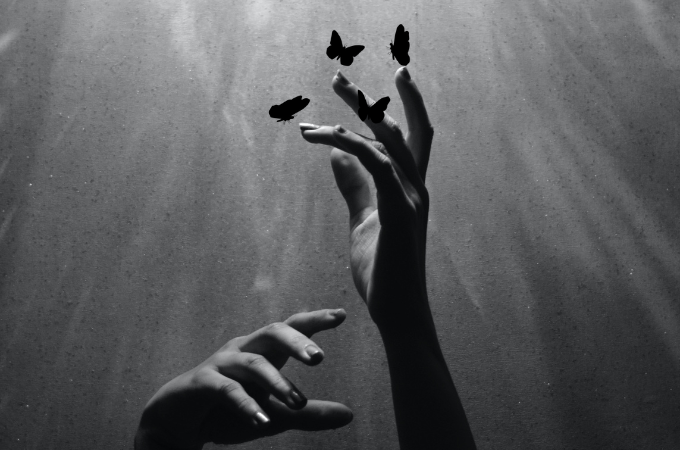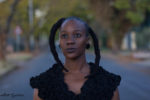
“Black Butterfly” is the name for the freedom songs sung by Black women. The songs detail Philosophies of Black Freedom. The Philosophers in focus are Zoë Modiga, Ann Nesby (of Sounds of Blackness), and Deniece Williams.
Black Butterfly (She/Them/Her) depicts a freedom that imagines Black Women at its centre yet does not neglect how she is part of a Black collective. Even through the pen of Duke Ellington – lyrics bellowed by Sarah Vaughan – Black Butterfly belongs to Her wayward Self. Messianically, Ellington imagines a woman – “Queen of the Night” – whom he can save from loneliness and social-ridicule and possibly love into the Black Butterfly he believes she is – he writes this as a complimentary note. From what the women Philosophers sing, freedom is not for him to give. It is Hers to desire. It is hers to possess, too. From their imaginings, pens and throats, Black Women’s freedom is communicated with more complexity for Black Women. Philosopher Deniece right down to Philosopher Zoë, emphasise a freedom that requires Black Butterfly’s self-awareness – particularly of Her own capacity to fly. An embodied consciousness. Philosopher Ann co-writes (and Sounds of Blackness collectively sing):
Black Butterfly, you can do most anything your heart desires
Freedom comes from understanding who you are
it’s time to reclaim your place amongst the stars
spread your wings and fly
Awaken a genius that’s been asleep too long
These Philosophies about Black Butterfly begin where She has awoken
from slumber. She has made it through repression and isolation — alive. Her
aliveness cannot be taken for granted. She has made it through death designed and death unmeditated. Many have not made it out of their various states of sleep, while some did not even reach their silken tombs to sleep uninterrupted and peacefully. Through these Philosophers we know that the Beautyful Ones are born: part birthed, part having birthed themselves anew.
Black Butterfly beauty is the state of Her being a butterfly. Phenomenology.
An isiZulu proverb tells us that a butterfly, any butterfly, is the dotted, embellished One who displays her colours in rest and in flight… the One who does not get her meat stolen like her colourful, flying companions: the birds. A Yoruba proverb warns of any butterfly’s suffering if She tries to mimic a bird instead of being Herself. Philosopher Ann proclaims that Black Butterfly’s worth lies in Her “genius” and refers to Black Butterfly – a collective identity – as “a people with a beauty rich and strong/ A heritage that rates second to none.” Moreover, Black Butterfly is “original”: “equality does not change them to fit in.” Thus, Black Butterfly is beauty. She is not simply accommodated by standards of beauty and Being, She is already Existing, and embodies beauty in Her own right. Hers exists even in the presence of the beauty of others – not as a condition of them being Beautiful.
In Her fullest state of being, the Philosophers sing, Black Butterfly flies and
flies and flies. The sky and stars are Her mates. Philosopher Deniece encourages Her to “rise even higher.” It is through Philosopher Zoë that we are reminded that there is a practice to being, even when there is a presumed innate ability to be. Philosopher Zoë focuses on this embodied practice: “Flying low but through the sky, black butterfly/Glad your wings know what to do.” The backstory of this embodied knowledge of flying is:
You fly quite low to realize
You’re still in the sky
You’ve taught your wings what they should do.
Now it’s really no surprise, black butterfly
You know where you belong
Hers is a quiet rumination of flying. Slow work. Slowness in Freedom. The first half of the song is her assuring Black Butterfly that this ability to fly (Freedom) is not by mistake – it is both learnt as well as a practice to which She belongs to from (re)birth. Freedom is both birth-right and self-taught. By the end of her philosophical text, Black Butterfly is above the clouds (“ngaphezu kwamafu”) and Zoë’s tone shifts into a playful one that no longer needs to assure but can trust that Black Butterfly trusts herself to be… to fly. To fly is to Be. beauty is not – in these Philosophies – primarily captured by Black Butterfly’s transformative abilities or Her many phases of life. Ties to the Cocoon are broken off, the immaturity of being a trapped larva has come to an end and the caterpillar is not at all acknowledged. Unfortunately. But an Aruban butterfly-keeper reminds visitors: “You cannot love butterflies without loving caterpillars.” When we, too, neglect the complex, inseparable life histories of Black Butterfly: beginning from sleep and (re)birth, we neglect her birth and formative years, we risk proclaiming her unalive (therefore unbeautiful and unfree) before she metamorphosed, we miss a broader scope of interiorities, embodiments, beauties, and freedoms.
Veins strengthened, wings dried and wings able, Black Butterfly of the Philosophers is blessed with her beauty and her new freedom. She is burdened by it, too. Self-awareness for Black Butterfly is freeing yet it is also a necessary condition for freedom to be claimed and possessed. Biko, too, says that self-consciousness is a condition of freedom. Through Philosopher Deniece we learn that: Black Butterfly is tasked to be vigilant of Herself, to be an exhibitionist of Her own beauty and to be an ambassador of Her new freedom. The Philosopher sings:
Black butterfly, sailed across the waters
Tell your sons and daughters what the struggle brings
Black butterfly, set the skies on fire
Rise up even higher.
Philosopher Deniece also reminds Black Butterfly that “while you slept/the promise was unkept.” Thus, the onus is on this now awakened, previously enslaved entity (signalled through the word “sailed”) to ensure that the promises are kept, and that collective awareness of struggles prevails. Philosopher Ann, in Sounds of Blackness, also makes her demands of Black Butterfly known: “Now that you are on top keep rising.” The charge to be Herself through flight, exhibition and networking with the sky and stars – even through slow Freedom – raises the possibility of exhaustion for Black Butterfly. Exhaustion will set in only if the other aspect of Her Being is not embraced. Rest. Rest is Freedom, too.









COMMENTS -
Reader Interactions